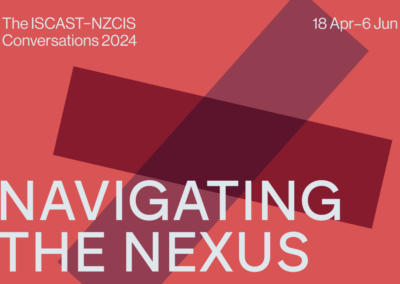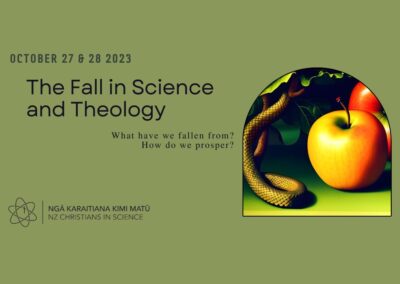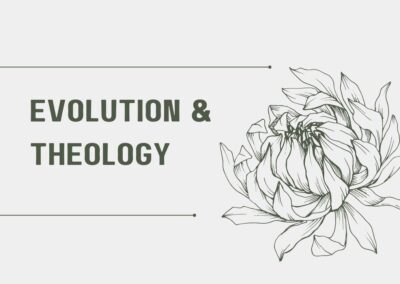The Convo
Explore Resources
Media Type
Topic
- All Topics
- Animals
- Anthropology
- Anxiety
- Aristotle
- Biography
- Biology
- Causation
- Christmas
- Church
- Climate Change
- Consciousness
- Contemplation
- Cosmology
- COVID
- Creation
- Darwin
- Dawkins
- Disease
- Divine Intervention
- Doubt
- Easter
- Ecology
- Education
- Eschatology
- Ethics
- Evil
- Evolution
- Extinction
- Faith
- Flourishing
- Free Will
- Freedom
- Genesis
- Healing
- History
- Immunology
- Intelligent Design
- Launch
- Matauranga Maori
- Mathematics
- Meaning
- Medicine
- Naturalism
- Neuroscience
- New Zealand
- Pandemic
- Physics
- Postgrad Research
- Resurrection
- Science and Theology
- Science Fiction
- Suffering
- Technology
- Vaccination
- Webb Telescope
Author/Speaker
- All Authors
- Alan Cameron
- Amy Ross
- Andrew Saunders
- Andrew Shamy
- Andrew Sloan
- Andy Gosler
- Anne Van Gend
- Bethany Sollereder
- Cameron Surrey
- Chris Clarke
- Doru Costache
- Dr. Andrew Shepherd
- Dr. Ashley Bloomfield
- Dr. Brian Broom
- Dr. Christa McKirland
- Dr. Drew Everhart
- Dr. Graeme Finlay
- Dr. Gray Manicom
- Dr. Greg Liston
- Dr. Jacob Martin
- Dr. John Owens
- Dr. Maja Whitaker
- Dr. Maureen Miner
- Dr. Nicola Hoggard Creegan
- Dr. Philip Pattemore
- Dr. Rebecca Pullon
- Dr. Ruth Barton
- Dr. Sean Devine
- Dr. Yael Klangwisan
- Dr. Zachary Ardern
- Eliala Fihaki
- Emma Belcher
- Fr. Antonios Kaldas
- George Seber
- Grant Gillett
- Gray Baldwin
- Gray Manicom
- Hans Weichselbaum
- Jay Matenga
- Jennifer Lewis
- Joanna Leidenhag
- Kathleen Rushton
- Kim Hill
- Martin Samson
- Olivia Yates
- Paul Stock
- Pete Armstrong
- Peter Atkins
- Peter Lineham
- Petrus Simons
- Prof. Carolyn King
- Prof. Christopher Southgate
- Prof. Denis Alexander
- Prof. Gareth Jones
- Prof. Jeff Tallon
- Prof. John Stenhouse
- Prof. Margaret Bedggood
- Prof. Neil Dodgson
- Prof. Peter Lineham
- Prof. Ted Davis
- Prof. Tom McLeish
- Rev. Dr. Chris Mulherin
- Rev’d Canon Mere Wallace
- Robert Mann
- Sarah Beattie
- Sean Cleary
- Silvia Purdie
- Stephen Garner
- Stephen Pattemore
- Ven. Dr. Lyndon Drake
- Wesley Webb
- William Hurren
- Xavier Simons
- Yael Cameron

Moe Mai Rā, Rod Oram.

Are you ready for a jam-packed series of wide-ranging discussions at the intersection of science and Christianity?

Come join us for an engaging discussion about the universe's fine-tuning for life at our upcoming event, where we'll unravel its mysteries and delve into the intriguing science behind it.

Emma Belcher examines half of life time of pain and her own journey in understanding it in light of a good God.

Advent, in the Church's tradition, marks a period of expectant waiting and preparation for the celebration of the birth of Jesus Christ. It's a time to reflect on hope, peace, joy, and love, as the faithful anticipate the coming of Christ both in the historical event of his birth and in the anticipation of His return.

Sue Genner (Tauranga priest and GP) reviews a book by Karen Bakker on how technologies are helping people to hear non-human sounds and how this opens us up to the voice of nature.

Schools and Churches Program

Schools and Churches Program

How does one even begin to make sense of this given the shift from the Holocene to the “Anthropocene”?

Can we imagine a doctrine of the fall that is true of evolutionary science and leaves room for hope?

Come and be a part of our weekly online discussions as we examine some of the most challenging ethical issues of our time.

Can we imagine a doctrine of the fall that is true of evolutionary science and leaves room for hope?

Come and join us for our annual Winter Lecture series. This year we will be joined by four speakers discussing Theology and Science Themes in Contemporary Science Fiction.

The ISCAST–NZCIS Conversations are back for 2023! Join us for 9 weekly online conversations from the 13th of April to the 8th of June. In this series, we’ll be deep-diving into the world of consciousness, knowledge, and the self.

Sometimes as adults we forget that all our reflections on science and faith have a history and that we all came to this space by a long route, sometimes deep into childhood. In this blog we get a rare insight into the thinking of a child, one who thinks very hard and very deeply about the questions that really matter.








